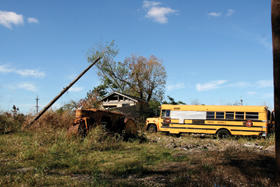Post-Katrina School Reforms Leave Blacks Disenfranchised: Report

The status of the New Orleans school system post-Hurricane Katrina is a personal issue for University of Illinois Urbana-Champaign professor Adrienne Dixson.
Now an academic focusing on issues of urban education and school reform, Dixson taught in the New Orleans public schools from 1991 to 1995, and has family in the region.
In a paper co-written with scholars from Georgia State University in Atlanta, she says, “We talked about the ways that public education has changed in a way that we argue displaces and disenfranchises people of color in particular.’’
Hurricane Katrina struck New Orleans a decade ago. A year later, she notes, 7,000 teachers and administrators were fired — “4,000 of whom were African-American. So that radically changed the racial demographics of the teaching force, [which] prior to Katrina, had been predominantly African-American.”
After teachers were fired, a shift to charter schools occurred under the direction of Recovery School District Superintendent Paul Vallas, the former CEO of Chicago Public Schools.
Each charter school has a separate school board. With that shift to charter schools and the recruitment of new teachers, the teaching staff moved from black majority to white majority. “That in itself isn’t necessarily a bad thing, but most of those who have taken over control of schools are transplants,” Dixson says.
According to a UIUC news release on the article, after Katrina, the state of Louisiana took over 102 of the Orleans Parish School Board’s 117 schools that were deemed worst performers, and created the Recovery School District (RSD). According to the article written by Dixson and her co-authors: “By the beginning of the 2012-2013 academic year, 72 of 90 public schools in New Orleans were operating as charter schools (most with operators based out of state) and 84 percent of students were attending them.
“At the conclusion of the school year 2013-2014, all of the 107 schools that the RSD took over have either been closed or chartered. The [Orleans Parish School Board], the only elected school board in the city, controls just 6 traditional schools and is the authorizer of 10 charter schools. In school year 2004-2005, the OPSB controlled 128 schools.”“We argue that this shift in control and governance … radically alters the democratic process for governing schools,’’ she says.
According to the article, which was published in the journal Qualitative Inquiry, “In 2008, Orleans Parish School Board became majority white, a shift that had not occurred in over 20 years.”
Students, parents, former teachers and others were interviewed by Dixson’s team. One alumnus of John McDonough High School was quoted as saying: “‘What we

